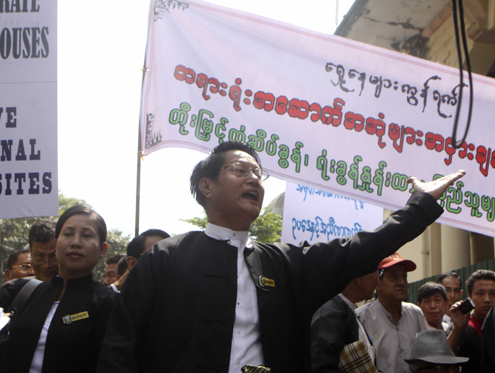“Everybody talks about the rule of law but they don’t talk about how to support the judicial system to provide the rule of law,” a senior member of Burma’s judiciary told the International Commission of Jurists (ICJ) during a meeting in the capital Naypyidaw recently.
Four decades of brutal authoritarian rule systematically weakened the independence and integrity of the legal system. With reforms underway, judges in Burma are facing demands to provide justice, accountability, and stability — virtually overnight.
Burma’s judiciary, however, simply does not have the resources to meet this demand at present.
As the country prepares for a groundbreaking general election next year, it is important for all political parties and candidates to make clear how they would strengthen the judiciary’s ability to carry out its responsibilities.
It is also crucial for the international community to provide all the help it can.
Everyone in the so-called New Burma is calling for the rule of law, including President Thein Sein, opposition leader Aung San Suu Kyi – who is Chair of the Parliamentary Rule of Law and Tranquility Committee — ethnic and religious minority groups, civil society and business people.
But ‘rule of law’ evidently means different things to different people.
Some in Burma seem to equate it with ‘greater security.’ Others view rule of law as important for different reasons, as the country proceeds down the rocky path of reforms: law and order; economic growth and development; fighting corruption; and fostering good governance.
What is clear is that strengthening the rule of law, regardless of why people invoke the concept, requires an independent judiciary. Whether it’s for fighting corruption, fostering good governance or attracting foreign investment, Burma needs judges and lawyers who are able to operate independently and impartially to provide proper jurisprudence and, importantly, change the public’s poor perception of the system.
[related]
A crucial point to remember is that an independent judiciary is not just an instrument for achieving desired social ends. An independent judiciary is the law.
Article 10 of the Universal Declaration of Human Rights says that everyone is entitled to a fair and public hearing by an independent and impartial tribunal. The United Nations General Assembly has for its part unanimously affirmed that ‘human rights, the rule of law and democracy are interlinked and mutually reinforcing’.
International laws and standards also state that governments must prioritize the provision of sufficient resources to ensure the judiciary’s ability to provide independent and impartial tribunals.
Burma’s judiciary desperately needs these resources.
Many courthouses lack the most basic facilities. Some are too small to accommodate public audiences, despite the 2008 Constitution guaranteeing the right to a public trial. At present, judges in Burma do not have full access to the necessary cases, laws and international standards.
Furthermore, they are underpaid and treated as basic civil servants instead of as an independent and equal branch of government. Those in remote areas still face pressure from the military, government officials and powerful local interests.
In its December report “Right To Counsel: The independence of lawyers in Myanmar [Burma]”, the ICJ found that corruption, which is widespread in almost every sector of the country, also plagues the legal system. Significantly, it also erodes the public’s perception of judicial integrity.
Add to this the unprecedented scrutiny and criticism from a newly liberated and emboldened media, and it is easy to understand why Burma judges feel that they are being asked to do the impossible.
There is no question—even inside the judiciary—that there is a lot of room for improvement in the recruitment, training, conduct and integrity of the system. To its credit, the Burma judiciary is now trying to adapt to its new environment and the increasing demands placed upon it.
But improving the independence of the judiciary and bolstering the rule of law requires a systematic and concerted effort from the entire government and in particular from the powerful executive and legislative branches of the administration.
The executive and legislature must assist the judiciary to become a proper, equal branch of government, able to regulate its own affairs and be accountable for satisfying the public’s demands.
Amidst competing clamor for attention, it is crucial for the Burmese government, and the many international supporters eager now to assist, to ensure that the judiciary is granted the independence and resources necessary to improve the rule of law in Burma.
The task is daunting, the challenges enormous. But this is the only way to strengthen ‘rule of law’ in the evolving ‘New Burma’ and improve the dire human rights situation for everyone living in the country.
Sam Zarifi is the International Commission of Jurists’ Regional Director for Asia and the Pacific.



